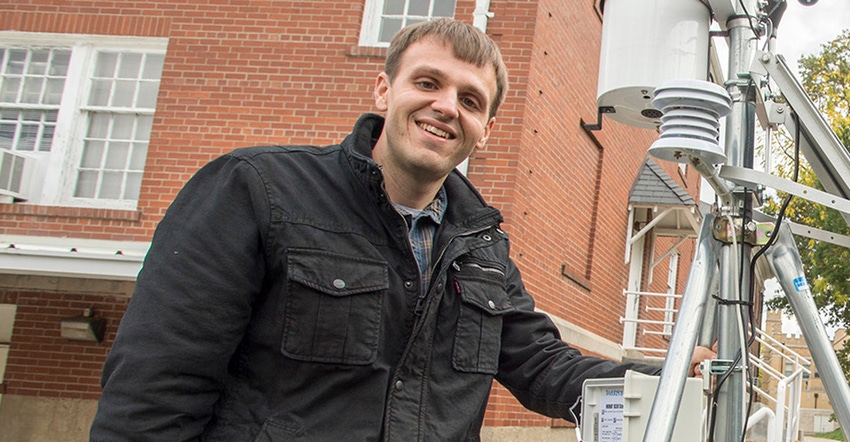
As of Aug. 15, Illinois has a new state climatologist. Trent Ford replaces Jim Angel in the University of Illinois-based office. Angel served in the position from 1996 to 2018.
Ford comes to Champaign after teaching and conducting research at Southern Illinois University. He also has a bachelor’s degree from Illinois State University, which means his Illinois geography and university experience has been broad. At SIU, he taught courses on weather, climate and society, and hazardous weather, and he’s done research on heat wave predictability, in hopes of developing ways to use soil moisture data to improve drought monitoring.
What does a climatologist have to do with farmers — and what can they get from him? Here is Prairie Farmer’s interview with Ford:
What does it mean to be the state climatologist? Since about 1972, the state of Illinois and many other states have had a state climatologist who has basically been a point of contact to get the most up-to-date, scientifically accurate information about climate and weather. In a state like Illinois, that has historically mainly applied to agricultural applications.
And beyond agriculture? It’s really meant to provide citizens and stakeholders in Illinois with weather and climate information to help them in whatever need they have. Beyond ag, there are things like urban planning, water supply and demand strategy, and those sorts of things. So, my job as Illinois state climatologist is to provide the right information, the right data, the products to fit those needs.
Where’s home for you? I’m originally from Roanoke, Ill., in Woodford County. I went to Illinois State University and got a bachelor’s degree in geography and then went to Texas A&M and did a master’s and Ph.D. in geography with a focus on climate. Then I moved back as an assistant professor in geography and environmental resources at SIU in Carbondale; that's where I’ve been the last four years.
Tell us about your research. As a climatologist, I study the role of the land surface in a climate system. I’m interested in how soil moisture interacts with the atmosphere, especially in the case of extreme climate events like drought and heat. And how better monitoring and representation of the land surface can help us with monitoring and predicting of those events.
What can you tell us about changing weather patterns in Illinois? Over the last 30 years, the Midwest climate has gotten wetter. But saying we’re getting more rain doesn’t paint a complete story. What’s happening is that that rain is falling in more intense events that are happening less often. The deluge-to-droughts this year are a perfect example of our extreme wetness in many parts of the state but followed by a prolonged a period of dryness. In Carbondale right now, we’re a good 10 to 11 inches above normal where we usually are this time of year, but lawns are all brown because we’ve been without a significant rainfall event for about three weeks.
What does that do to humidity? Humidity in the Midwest has been increasing. When we get those elevated temperatures, they get coupled with high humidity. For livestock, that means that evaporative cooling systems — spraying the hogs down — becomes less effective at high humidity levels coupled with high heat. So, if you just get the elevated temperatures but your humidity’s pretty low, you spray down the animals and that cools them down effectively. The more humidity you have, the less that’s the case. That’s a change that has played out over the last few decades in Illinois.
What would you want to communicate to farmers regarding climate and weather? The state climatologist office is here to serve the citizens of Illinois, and that definitely includes farmers. The climate and weather information they need, questions on past or current conditions, outlooks for the next season, future projections about climate change — the office is here to serve them for that purpose.
How do you access that information? There is a website with lots of great information, but it’s not super mobile-friendly. I want to revamp it so it’s easy for folks to use and find data, especially if you’re sitting in your combine with a smartphone. That’s something I hope to do in the next couple of months, so we can provide information efficiently so farmers can make the decisions they have to make.
Email Ford at [email protected], or visit stateclimatologist.web.illinois.edu. Previous state climatologists were Jim Angel (1996-2018), Wayne Wendland (1981-96) and Stan Changnon (1972-80).
About the Author(s)
You May Also Like






